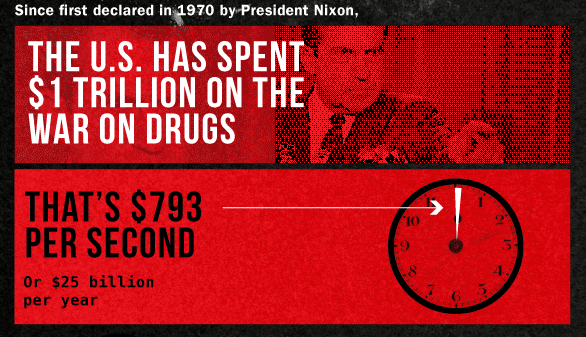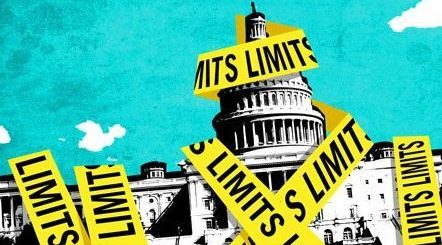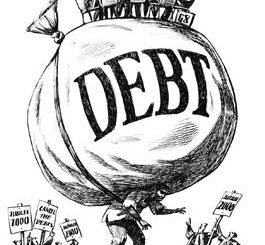Unrestrained Government Squander

The Failed Drug War
A superb illustration of perhaps the worst efforts of government can be found in the relentlessly inept, futile, and prodigal initiatives to combat and eradicate certain narcotics habitually indulged in by an unfortunate few. Many question my use of such an example, but I cannot ignore stubborn, futile, and indefensible policies laden with suffering and slaughter.
We often have opinions about the way one chooses to live his or her life. Judgments emanate quickly and intensely when the behaviour, the activity, the deed committed, or the attitude displayed profoundly offends the observer. But we live in a democracy wherein tolerance firmly roots itself and flourishes. The citizenry cherish the right to labour, worship, utter, and express themselves devoid of legal or physical constraint whilst such actions do not conflict with the health and security of another. Endowed with such unprecedented freedoms we eclipse and transcend nations crippled by countless usurpations, suffocating restrictions, unwarranted proscriptions, or the imperious and merciless whip of martial law.
However, even within tolerant communities vestiges of the lordly desire to control and dominate persist in peculiar forms. Reactionary laws, enacted formerly when ignorance and moral rigor held sway, still obtain but slowly succumb to advancing knowledge and understanding. The laws against prostitution and the use of certain drugs are salient examples, and, god willing, judicious reasoning and persuasion may soon occasion their extinction.
The decision to outlaw or prohibit access to substances such as cocaine, marijuana, hashish, and numerous others displays manifestly the hypocrisy, irrationality, stolidness, and danger of the authorities and of society when they willfully ignore the most fruitful course for the addict, people, and nation, deliberately wasting billions of dollars of resources and generating a maelstrom of crime, disorder, instability, and lawlessness. Victory is futile and shall always remain so, and the continuance of these unavailing efforts at controlling or squelching illegitimate drug use penetrates deeply into irrationality.
Throughout our lives we shall come into contact with people intent upon self-destruction. We may genuinely care about those who embark upon disastrous endeavours and attempt every means of dissuasion. We may state the inevitable consequences or clamour for reason to take hold, but when an individual has fixed his course, there is little that can be done to deter or correct him. Should we then compel with legal or physical force a change of direction? In most cases we lamentingly, but wisely, refuse such meddlesome involvement. We hope that the subject shall recognize folly in adversity, and preferably prior to calamity. Commiseration, moral guidance, and limited intervention are all that can be provided to the profoundly obstinate and destructive. The individual must select his path and revel in success, grieve in defeat, or stagnate in mediocrity. That is life.
So why is it that in certain circumstances the state and the citizenry withdraw toleration and determined criticism and favour direct intervention? Why is the legal and enforcement apparatus commissioned to force conformity to the sentiments of the majority from an unfortunate few deviating from sanctioned and dictated moral law? The majority fervently and actively condemn a diminutive minority for unique preferences and indulgences with consequences beneficial or detrimental to the individual alone. I do not speak of persons that bully, plunder, violently assault, and injure. I speak of persons that are relentlessly persecuted and imprisoned because they embrace certain activities and behaviour ostensibly reprehensible to the majority, and that, if harmful, are harmful to the partakers alone.
Inexplicably, the Government and the citizenry, after decades of vain and desultory effort, remain fiercely intent upon preventing a small number of persons from ingesting or inhaling certain substances. The state allocates immense resources to prosecute an objective that is irrational, costly, and futile, and an unjustified intrusion into the affairs of the individual. The limited resources of the judiciary, the policing agencies, and the prisons, presently and in years past, with scant success labour to stifle, impede, and squelch the sale of narcotics or certain services to an indulgent few endowed with insatiable desires. In Canada the costs of the struggle number in the billions of dollars and in the United States in the tens of billions of dollars.
Each effort upon the part of the government has been swiftly and formidably countered by the inherent forces and properties of the crime. The number of persons involved is considerable and the few successes are dwarfed by countless failures. It may be possible to apprehend, indict, and convict a knot of the offenders, but the multitude escape notice. Were the authorities to increase resources ten-fold, the effect would still be negligible. The country is so large and the people endowed with such freedom that not even an officer situated upon every corner would deter let alone eradicate the activity. The more numerous the police, the more clandestine the crime. Concentrate enforcement in one area, crime moves to another. If the authorities aggravate the penalties, the criminals inflate their prices, which result swiftly encourages more cunning methods of importation, production, and distribution, and eventually greater volumes and moderating prices. In summary, the more audacious the police, the more nimble and mobile the criminal.
The quantities involved are so minute that detection shall always remain at a deplorable minimum. Betrayal by those privy to details accounts for the majority of the apprehensions of the perpetrators and of the illegal substances, not the mechanisms or apparatus instituted to thwart importation or domestic production. Annual consumption of Cocaine and Heroin in the United States could be satisfied with the contents of a handful of trailer transports, amounts that easily elude the scrutiny and awareness of the authorities no matter how vigilant and resolute. Even if the quantities entered the country upon a daily basis, seizure would remain marginal because of the incalculable volume of legitimate cargo entering the country. With the meagrely patrolled expanse of the nation and the endowments of unfettered rights of mobility, covert methods of importation, domestic production and distribution approach the infinite while seizures remain pitiably scant.
The expenditures upon law enforcement, prisons, the judiciary, escalate without foreseeable limit. Yet, these costly undertakings yield little success. The traffic in these substances intensifies, the addicts in numbers undiminished continue to seek and secure desired substances, and the criminal element continues to supply these illegal proclivities and intoxicants profitably and with veritable impunity. Even within the prisons, within institutions that fundamentally curtail liberties of movement, of association, of speech, of access to information, of use and ownership of property, and of labour, and in which behaviour and activity is vigilantly monitored, importation and circulation of these prohibited substances proliferate inexorably.
The legislative declaration of illegality and the consequent enforcement activity propels prices for banned and, indirectly, illicitly used drugs to considerable premiums. The generation of sufficient income to procure moderate amounts of these substances or to indulge in certain activities resides among an elite few. Criminal involvement, whether immediate or eventual, for the majority of drug addicts becomes the principle means of acquiring the said substances or services. Thus, criminal enterprise flourishes in order that the addict may garner fleeting respite from the obsession with which he is plagued.
In the community mayhem erupts. Homes are invaded and ransacked, businesses plundered by those within and without, vehicles purloined, financial institutions and financial transports haphazardly robbed, and citizens molested, disturbed, endangered, threatened, irreparably harmed, and inexplicably murdered. Billions of dollars in damage to property and incalculable injury to life are inflicted in order that pitiably scant yields of funds may bring temporary succour to the demented and enslaved addict.
Some neighbourhoods are overrun with lawless gangs tenaciously protecting their lucrative avenues of distribution, and with desperate consumers, and with the violence, corruption, and destruction such a volatile mixture sires. Devoid of determined enforcement presence, under siege, inundated with crime, schools infested with drugs and their purveyors, residents intimidated by powerful and persistent criminal bands, the value of property and life depreciating, and weapons and their use proliferating, these troubled communities hopelessly and needlessly suffer abounding anarchy.
Persons many respectable, honest, industrious, and clever, save for this profound and inescapable vice plunge to the seedy, lawless, violent, and barbarous depths. The desperate and wretched addict has in the pursuit of drugs committed a myriad of evils. Ordinary people have suffered merciless and relentless beatings for the prize of a few dollars. The treasured security of the home has been repeatedly transgressed, its contents rifled and valuables purloined. Vehicles, stolen and sold piecemeal or whole, earn the felon a fraction of their value. When finally apprehended and convicted, the addict, stained with criminality, faces almost insurmountable obstacles in ever offering a marked and beneficial contribution to the society in which he dwells. Much talent and mental resources whither in our inglorious prisons and face permanent exclusion from the middle and upper climes of the labour market because of the arbitrary determination of what constitutes a criminal vice. Their families, bereft of stability and eventually deprived of a principle member, collapse into ruin or bear grievous hardship. And frequently to the state these forsaken turn for aid and support.
The medical system, inundated with addicts suffering overdoses, diseases, and complications engendered by the addiction and by the attendant criminal life, overwhelmed with those injured in the perpetual effort to distribute the prohibited or illicit substances, its members corrupted or seriously tempted to corruption, and its resources presently strained by an ageing population, sees little relief and only relentless aggravation of present woes. Hepatitis and Aids, two lethal and novel threats to the lives of all, even young vigorous adults, count among those presently infected an astonishingly high number of intra-venous drug users. The percentage of those afflicted with AIDS falling within this group stands at approximately 30%. Each of the afflicted claims precious medical resources to mitigate and combat the debilitating effects of these horrific diseases. If those directing present drug policy obstinately persist with prohibition, the health system shall doubtless find itself compelled to sacrifice or endanger the lives of patients, drug addict or not, because of a crisis manufactured deliberately and maliciously by moral illusion and blunder.
For the unconscionable supplier of the substance or activity, the crime is indeed comparatively innocuous, profitable, swiftly executed, and repetitive. The purchaser is desperate and unbalanced, and the object of the obsession easily procured in a nation zealously protective of liberty. Because of the lucrative returns, competition stridently beckons and attracts all. As the agonists strive for profit beyond the bounds of law and formal protection, conflicts violently sanguine and ruinous occur with frequency.
Confederacies of lawless individuals develop, broaden, and thrive. Corruption among public officials flourishes, and casualties among foe and innocent remorselessly accrue and accelerate – all to gratify the demand for soothing substances of relatively innocuous consequence. The returns earned procure the means, formerly remote, to finance criminal enterprise disturbingly complex, profound, audacious, and ruthless. And the designated law enforcement agencies and their affiliates find themselves overwhelmed in weaponry, cunning, scope, and knowledge.
The authorities, expending billions of dollars, fervently strive to dissuade a marginal few from ingesting certain substances and pursuing certain diversions. But when the subject derives soothing comfort from them, the acutely disturbing and deceitful messages of abstention avail nothing. The intended target does not agree. With innumerable substances legally and abundantly used in the alleviation of physical pain and mental pain, why object so strenuously when some select a substance bearing great personal benefits, but inexplicably lacking state sanction? Society does not confront alcoholics or smokers, hunt them, condemn, imprison and penalize them. Then why zealously persecute the knot who find comfort in certain alternatives, many bearing far less risk to health? Where is the reasoning mind in the devisement of such dangerous policies?
The laws enacted and the policies devised are as irrational as they are impracticable. To pursue, arrest, and imprison those afflicted with an intractable compulsion to consume certain substances or to indulge in certain behaviours, consequential to the individual alone, seems ridiculously harsh, inane, and disastrous. These unfortunate people menace themselves, not the nation. They possess a medical or psychological condition which these substances alleviate, and without the preferred substance or activity, they are lost. Addictions are symptoms of maladies, not causes, and, regrettably and sadly, it is these symptoms that receive the full legislative attentions of the authorities.



